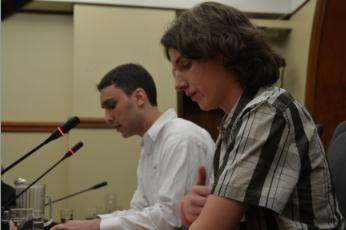
Catholic students fighting for gay-straight alliances (GSA) depute to the standing committee for social policy. Credit: Andrea Houston
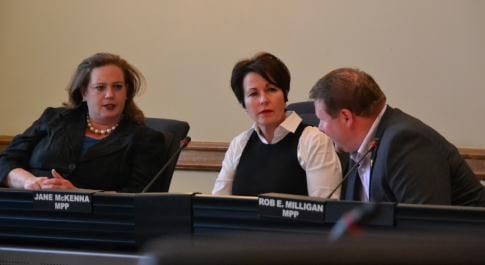
Tory MPPs Lisa MacLeod, Jane McKenna and Rob Milligan confer during committee. Credit: Andrea Houston
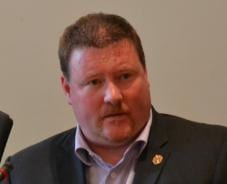
Progressive Conservative deputy education critic Rob Milligan. Credit: Andrea Houston
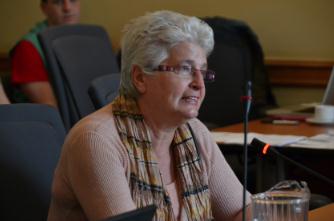
Barbara Hall, chief commissioner of the Ontario Human Rights Commission, tells the committee that the OHRC supports students' right to name groups as they see fit. Credit: Andrea Houston
The president of the Ontario Catholic School Trustees’ Association (OCSTA) has told Xtra that Catholic boards will ignore new anti-bullying legislation and continue to ban gay-straight alliances (GSA) even if the province passes a law compelling them to do otherwise.
During the final day of public deputations to the standing committee on social policy at Queen’s Park May 15, Nancy Kirby declared support for “anti-bullying clubs” but said Catholic schools will not allow GSAs.
“They can name the clubs what their principals [allow] under existing administrative guidelines,” she said.
Kirby’s position effectively means that unless the government clarifies the language in the Accepting Schools Act (Bill 13), the new anti-bullying legislation will give the cold shoulder to Ontario queer Catholic youth, says Casey Oraa, vice-chair of Queer Ontario. “The government has never enforced their policy,” he says, noting that GSAs have previously been recommended for all schools. “Why should we believe they would start now?”
Oraa has joined other activists in calling for stronger wording in the final bill in order to mandate GSAs in all publicly funded Ontario schools if students ask for them.
Kirby’s statement came during the final day of Toronto depuations on two anti-bullying bills that have been before the committee. It is examining Bill 13 and the Progressive Conservatives’ Bill 14. Both will likely be merged before third reading. Meanwhile, deputations will continue in Ottawa on May 24. After that, the committee moves into clause-by-clause reading of the bill, May 28 and 29, then third reading by the end of the month.
The deadline to file an amendment for Bill 13 is May 24 at 5pm.
During four full days of public deputations, many spoke in favour of Bill 13, but many more rejected it, specifically any reference to GSAs, homosexuality, homophobia and gender. On May 15, speaker David Blair referred to homosexuality as “terrorism” and suggested that the committee consult “the ex-gay community” to submit amendments to the bill. John Del Grande, a Toronto Catholic trustee, said all bullying is the same and “supports should be universal.”
NDP MPP Peter Tabuns, who supports Queer Ontario’s recommendations to change the language around GSAs, says the province is on a collision course with Catholic trustees. “There will be a disagreement [between Catholic boards and the government] when this bill is passed,” Tabuns says, adding that he doesn’t think the dispute over GSAs will prevent the bill from passing third reading. Most legislators are supportive, he says.
Education Minister Laurel Broten told Xtra that GSAs can no longer be denied by school administrators. “The debate is over on whether students can have a club like a gay-straight alliance.”
Broten says the language in the legislation is strong enough for enforcement. “If students want to start a single-issue club, schools must support that club. It can be a GSA or another name . . . We know how important the single-issue clubs are. We also know that has been an area of challenge for some students who have asked for clubs and had that request denied. Bill 13, as it’s drafted, makes it very clear that that debate is over.”
Broten, however, said she will look closely at recommendations submitted by Queer Ontario, the Canadian Civil Liberties Association, Catholic Students for GSAs and others.
She didn’t give a firm answer when asked how she will ensure that Catholic boards comply with the law, noting, “I have every expectation that Catholic schools will adhere to Bill 13, and I feel very confident that they can.”
During question period on May 16, Tabuns asked Broten about GSAs and pushed her for confirmation that the government will stand behind students should the issue go to the courts.
The Catholic Civil Rights League’s Phil Horgan told the committee the government will face a court challenge if it tries to make Catholic schools accept GSAs. “In our view, Catholic schools have their [denominational] rights under the constitution. They are protected.”
A new Forum Research poll has found that a majority of Ontarians support GSAs. The poll also shows that 53 percent oppose public funding of Catholic schools, the Toronto Star reported May 16.
The issue has divided the Progressive Conservative caucus, which has previously voted against GSAs and anti-bullying legislation to protect queer students. On May 9 the sponsor of Bill 14, PC MPP Lisa MacLeod, told Xtra she has no issue with students choosing the names of their anti-bullying clubs.
Meanwhile, after the final deputation, PC MPP and deputy education critic Rob Milligan told Xtra, “I don’t care what you call the organization as long as you’re treated as an equal and you respect one another.”
He continued, “I support students . . . Call it whatever you want to call it.”
If the bill passes, the legislation will be implemented before September.
But what happens when a Catholic school doesn’t comply, and administrators deny students the right to form a GSA?
It’s a question Barbara Hall, chief commissioner of the Ontario Human Rights Commission, also wonders about. She told Xtra she is expecting a complaint from queer students who have been denied a GSA.
Hall says she suspects students have not yet filed a complaint because their cause was gaining momentum at the provincial level. Their activism pushed legislators to write a new law for Ontario in November and it appeared changes were on the way, she says.
“They have been asked to trust the system up to this point,” she says. “And now we are seeing many rights competing . . . There are some issues that will just not be worked out through a mutual understanding, and this may be one.”
Hall also expects the issue to end up in the courts. “There’s always the option to go to the courts, and sometimes when rights appear to be competing, that’s where it has to go, unless there’s a genuine interest by both groups that both can live with. It may be that the views are just so strong, and if that’s the case, then that’s where it has to be to be resolved.”
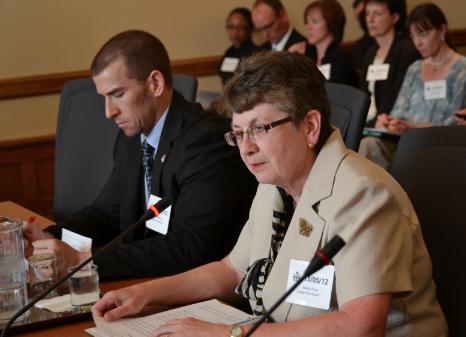
 Why you can trust Xtra
Why you can trust Xtra


